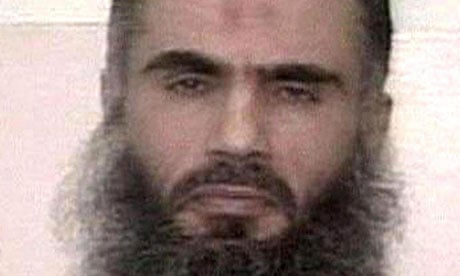The radical cleric Abu Qatada cannot be sent back to Jordan while "there remains a real risk that evidence obtained by torture will be used against him", judges have ruled.
The European court of human rights (ECHR) ruled there would be a breach of his right to a fair trial "given the real risk of the admission of evidence obtained by torture at his retrial".
It is the first time that the Strasbourg-based court has found that an expulsion would be in violation of European convention on human rights article six, the right to a fair trial.
The cleric, also known as Omar Othman, featured in sermons found on videos in the flat of one of the 9/11 bombers.
Law lords ruled almost three years ago that Qatada, described as "Osama bin Laden's right-hand man in Europe", could be sent back to Jordan, but he appealed to the court in Strasbourg, claiming he would be tortured if sent home.
But in a landmark judgment in February 2009, five law lords unanimously backed the government's policy of removing terror suspects from Britain on the basis of assurances from foreign governments.
The ECHR has now said in this case such a move would breach Qatada's right to a fair trial.
In its judgment, the court said: "In the absence of any assurance by Jordan that the torture evidence would not be used against Mr Othman, the court therefore concluded that his deportation to Jordan to be retried would give rise to a flagrant denial of justice in violation of article six."
Itsaid: "The court found that torture was widespread in Jordan, as was the use of torture evidence by the Jordanian courts.
"The court also found that, in relation to each of the two terrorist conspiracies charged against Mr Othman, the evidence of his involvement had been obtained by torturing one of his co-defendants.
"When those two co-defendants stood trial, the Jordanian courts had not taken any action in relation to their complaints of torture.
"The court agreed with Siac (the special immigration appeals commission) that there was a high probability that the incriminating evidence would be admitted at Mr Othman's retrial and that it would be of considerable, perhaps decisive, importance."
The latest court ruling means the 51-year-old cleric must stay in Britain.
Qatada has issued a series of influential fatwas, or religious rulings, in support of the killing of non-believers and a number of his videos were found in the Hamburg flat of Mohammed Atta, one of the ringleaders of the September 11 hijackers.
In 1999, he was convicted in his absence in Jordan of conspiracy to carry out bomb attacks on two hotels in Amman and providing finance and advice for another planned series of bombings. He was sentenced to life imprisonment.
